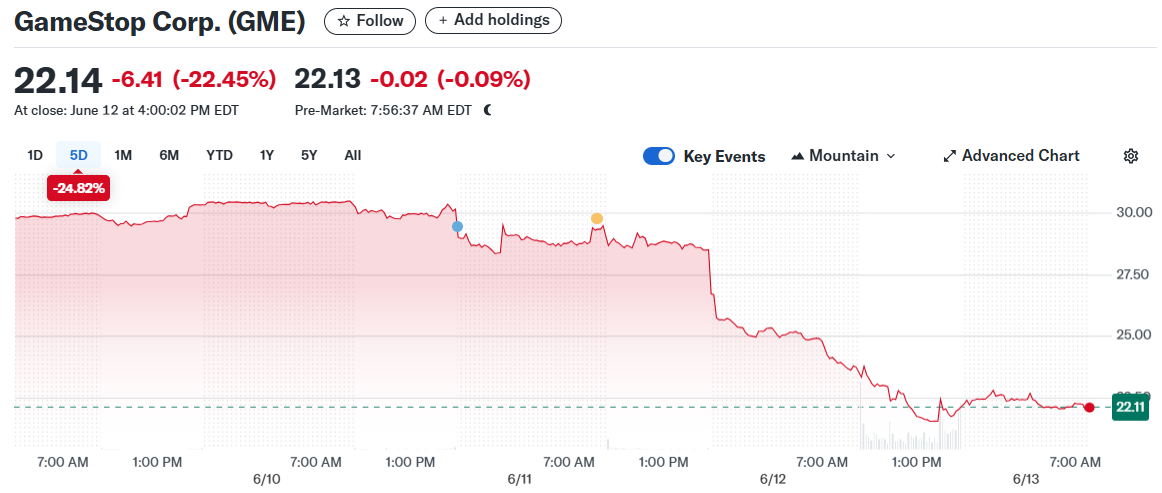TLDR
- GameStop stock crashed 22% after announcing a $2.25 billion convertible bond offering to fund Bitcoin purchases and acquisitions
- The debt offering creates dilution risk as bonds can convert to equity, potentially increasing share count and reducing shareholder value
- GameStop has now purchased 4,710 Bitcoins worth over $500 million as part of its treasury strategy shift
- Q1 2025 revenue of $732.4 million missed Wall Street expectations of $754.2 million despite beating EPS forecasts
- Wedbush analyst maintains Sell rating with $13.50 price target, seeing 54% downside potential
GameStop shares suffered their worst single-day drop in over two years on Thursday, plummeting 22% to close at their lowest level since early April. The crash came after the video game retailer announced plans to raise $2.25 billion through convertible bond sales.

The company initially planned to sell $1.75 billion worth of convertible senior notes but later upsized the offering. GameStop expects to raise approximately $2.23 billion in net proceeds, with potential to reach $2.68 billion if the full overallotment option gets exercised.
JUST IN: GameStop $GME to raise $1.75 billion to make "investments in a manner consistent with GameStop’s Investment Policy"
Buying Bitcoin is official GameStop Investment Policy 👀 pic.twitter.com/iOX4MwEEHU
— Bitcoin Magazine (@BitcoinMagazine) June 11, 2025
These convertible bonds represent debt that can transform into GameStop equity before or when they mature in 2032. This conversion creates dilution risk for existing shareholders as it increases the total share count.
GameStop stated the funds will support general corporate purposes, including further Bitcoin purchases and potential acquisitions. The company has already bought 4,710 Bitcoins now worth over $500 million as part of its treasury strategy.
This latest debt offering follows a $1.3 billion convertible bond sale in March. The pattern shows GameStop’s aggressive push to raise capital for its cryptocurrency strategy.
The stock’s decline reflects investor concerns about the company’s shift away from its core retail business. GameStop appears to be following the playbook of companies like MicroStrategy, using debt and equity to accumulate Bitcoin.
Weak Financial Performance Adds Pressure
GameStop’s Q1 2025 results disappointed investors earlier this week. Revenue came in at $732.4 million, missing Wall Street’s forecast of $754.2 million by nearly $22 million.
The company did beat earnings expectations with $0.09 per share versus the anticipated $0.04. However, this wasn’t enough to offset broader strategic concerns.
GameStop’s revenue has declined every year since 2023 as gamers increasingly choose digital downloads over physical store visits. This trend continues to pressure the company’s traditional brick-and-mortar model.
The 6% year-over-year revenue decline in Q1 highlights the ongoing challenges facing the retailer’s core business. Digital game purchases continue eating into GameStop’s traditional revenue streams.
Analyst Maintains Bearish Outlook
Wall Street analysts have largely stepped back from covering GameStop due to its unpredictable trading patterns and meme stock status. Few traditional analysts still provide regular coverage of the volatile stock.
Wedbush’s Michael Pachter remains one of the holdouts, maintaining his Sell rating on GameStop shares. His $13.50 price target suggests over 54% downside from current levels.
The analyst’s bearish stance reflects concerns about GameStop’s fundamental business challenges and risky Bitcoin strategy. The combination of declining retail revenue and crypto speculation worries traditional investors.
GameStop’s latest convertible bond offering represents another chapter in the meme stock’s volatile journey. The company raised $500 million for Bitcoin purchases in May, which sent shares down 10% in a single day.
The stock closed Thursday at $22.14, down from highs above $28 earlier this year. Pre-market trading Friday showed shares down another 0.59% to $22.02.
GameStop’s pivot to Bitcoin treasury strategy mirrors other companies seeking alternative growth paths. However, the volatility of cryptocurrency adds another layer of risk to an already challenged retail business.
The convertible notes due 2032 give investors the option to convert debt to equity over the next seven years. This extended timeline means potential dilution could impact shareholders for years to come.






